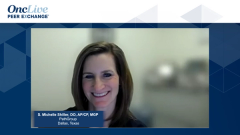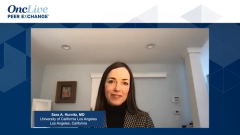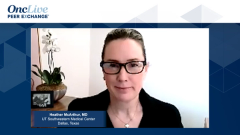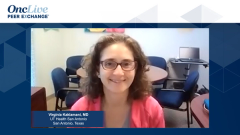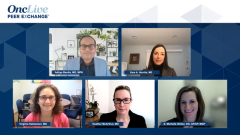
Continuing CDK4/6 Inhibition at Progression of HR+ Metastatic Breast Cancer
Key opinion leaders consider when it is appropriate to continue CDK4/6 inhibition at progression of disease in the setting of HR+ metastatic breast cancer.
Episodes in this series

Transcript:
Aditya Bardia, MD, MPH: For this patient, we send genotyping and get the results. There’s no detectable PIK3CA mutation, but ESR1 mutation was detected based on plasma-based genotyping. We’ll start with Heather. As a standard of care, what would you do in the second-line setting? Would you continue the CDK4/6 inhibitor if you had reviewed the data from the PACE and MAINTAIN trials?
Heather McArthur, MD: The short answer is that it’s hard to know. On the MAINTAIN study that Kevin Kalinsky presented at the last ASCO [American Society of Clinical Oncology Annual Meeting], that study looked at switching endocrine therapy and switching CDK4/6 inhibitor in patients who had previously progressed on CDK4/6–based therapy. It showed a fairly surprising improvement in progression-free survival [PFS]. Although it was a small investigator-initiated effort, with 120 patients, a PFS curve took us aback and…showed very consistent benefits across all the subsets that were interrogated. That has bolstered my enthusiasm for continuing CDK or considering a switch in CDK and a concomitant switch in endocrine therapy in the second-line setting. The challenge is, which 1? In MAINTAIN, most patients had previously received palbociclib as their CDK4/6 inhibitor, and only a very tiny population of patients received ribociclib. Whether you can extrapolate that data to the clinical scenario I described, which is first-line ribociclib treatment with a switch to a different CDK, or ribociclib should be continued, I don’t know. We don’t have those data.
We did get data at San Antonio [Breast Cancer Symposium] from the PACE study, which also looked at this question of continued CDK inhibition. This was presented by Erica Mayer. Patients were randomized to 1 of 3 arms after progression. On CDK4/6, they were randomized to receive fulvestrant vs fulvestrant with palbociclib vs a third interesting arm with PD-L1 inhibition in the form of avelumab. The bottom line is that the combination of palbociclib with fulvestrant was very similar to the fulvestrant-alone experience in terms of progression-free survival. Surprisingly, the avelumab arm performed better for reasons I don’t totally understand because avelumab wasn’t particularly successful in ER+ disease and prior trials like the JAVELIN study. I guess the long answer is yes, I’d consider a switch to a different CDK or even continued CDK inhibition in the form of ribociclib and change the hormone therapy backbone. This is where we need a little more experience. I tend to save abemaciclib for later based on the monotherapy data. I’m learning with clinical experience. These are all new data.
Aditya Bardia, MD, MPH: Absolutely.
Virginia Kaklamani, MD: Thankfully, we have trials ongoing, like postMONARCH, that will hopefully answer those questions. I don’t do that as standard of care. I’m surprised how many oncologists do—not because I’m against it, but we don’t have clear data on this. We all love CDK4/6 inhibitors, and that’s highlighted in trying to keep patients on them for as long as we can. Though switching from 1 to another makes more sense than continuing as they did with the PACE trial, especially given that the outcomes were pretty similar.
Transcript edited for clarity.


